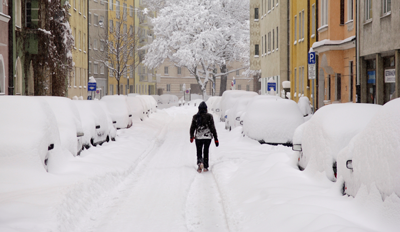What To Do With All That Snow?
Robert D. Cox, Jr. – Record snowfall, and the need to get that snow off streets and parking lots, has drawn attention to a little noted MassDEP Snow Disposal Guidance, first adopted in 1997. Because collected snow includes not just the white stuff, but road salt, sand, litter and automotive pollutants such as oil, MassDEP’s Guidance seeks to minimize the impact snow disposal may have on wetland resources and water bodies. Road salt, sand, and other pollutants can, of course, impact aquatic life and impair water quality.
Consequently, MassDEP’s Snow Disposal Guidance urges municipalities to select locations for snow disposal adjacent to or on pervious surfaces in upland areas away from water resources to allow snow melt water to filter into the soil, leaving behind debris to be removed come the springtime. The Guidance also recommends that the snow farm site be prepared and maintained, through fences or equivalent barriers on the downgradient side of the snow disposal site to remove debris as the snow melts.
The Guidance also has an emergency provision, which MassDEP announced earlier this week will now apply, to allow for disposal of snow in open waters. There is a limitation: the open waters need adequate flow and mixing to prevent ice dams from forming. And disposal of snow in salt marshes, wetlands, vernal pools, and other sensitive areas or where the trucks may cause shoreline damage or erosion is prohibited. To date, Boston, Hull, Quincy, Salem, and Marblehead have all received waivers from the MassDEP to dump snow into the Atlantic Ocean, and Newburyport, Lawrence and Lowell, into the Merrimack River. Boston, however, probably will not dump snow in the harbor, according to a Boston Globe report.
So here’s the kicker. The emergency snow disposal provision also states that the municipal conservation commission should be consulted to ensure that snow disposal in open water complies with local ordinances and bylaws. Because of home rule, many communities have by-laws that prohibit the disposal of snow in any water body, including rivers, ponds or wetlands. While it is great that MassDEP has reminded municipalities of the emergency provisions to its Guidance, triggered its provisions, and granted a few waivers, it comes down to, as it most often does in dealing with wetlands protection, local conservation commission approvals. Would the local conservation commission stand in the way of your community’s emergency disposal of the snow into water bodies including oceans, rivers and streams? Let’s hope not.
Categorized: Uncategorized



